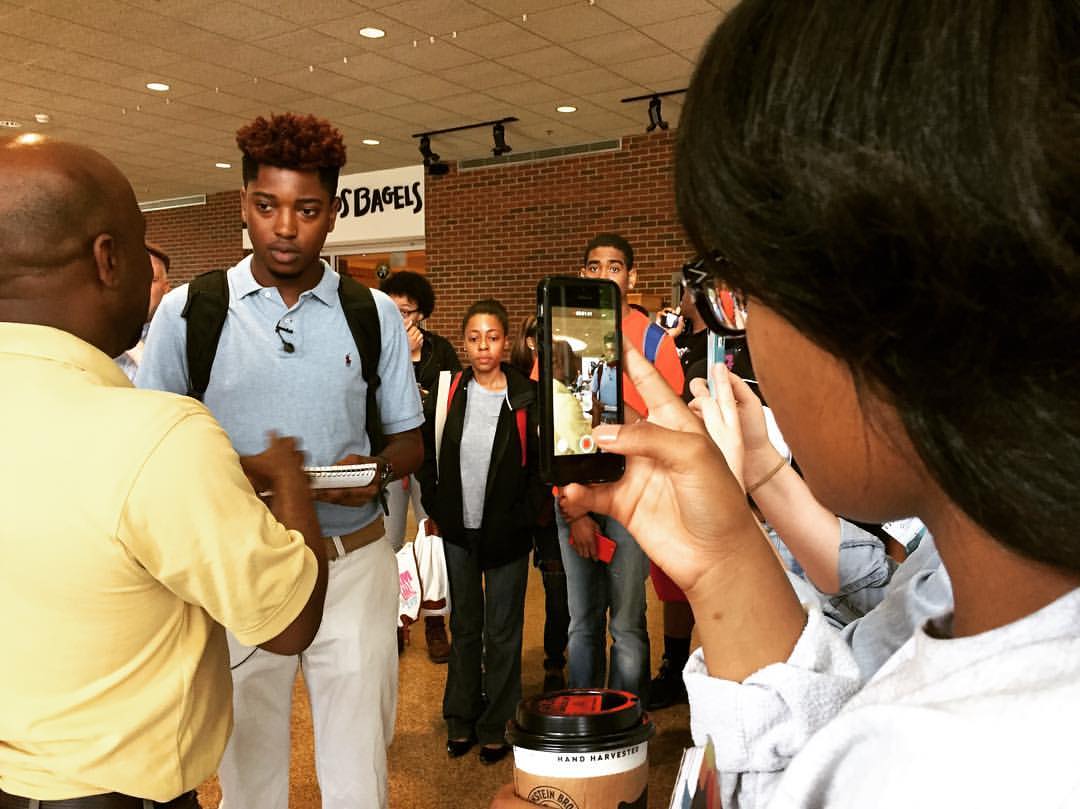About Student Media
Students on almost every college campus across the nation are engaged in journalistic practices that are comparable and similar to professional news media. Student media provides a semi-professional environment for students to cultivate skills related to media, creative and business operations while engaged in an academic setting. It is an experiential learning environment that enables students to apply academic curriculum in a practical setting.
Student media operations across the country provide a public forum for the expression
of student ideas and voices. At APSU, that public forum exists in the form of The All State newspaper and its online publications available at www.theallstate.org and its social media sites.

What makes student media different than professional news media?
Student media is protected by the First Amendment, which has been supported in multiple decisions by the Supreme Court, including Tinker v. Des Moines Independent School District (1969) and Hazelwood School District v. Kuhlmeier (1988).
The biggest difference the purpose and mission of student media is to provide students a structured and practical learning environment to apply skills and knowledge gained in the classroom. Professional media are career-oriented practitioners, and not normally students of journalism or communication.
Another difference between student media and professional media is usually the geographic region or area that is covered. Student media typically focuses its coverage on its campus or University while professional media have a much broader focus.
Obviously student media is run and managed by students, not professional media, so
there are differences in frequency of publication, budget, capability, experience,
etc.
What is prior review?
Prior review is any type of review or control of content before it is published. This could include the editing of news articles, control of editorial decisions regarding certain events, or control or influence of news assignments, or the outright censorship of the newspaper.
At APSU, there is no prior review of The All State. The students are assisted and supported through the newsgathering and publication
process by an adviser.
What does the adviser do?
The adviser serves as a coach and educator, but not an editor. The adviser does not assign students to cover specific events or topics, and does not prohibit students from covering specific events or topics. Instead, the adviser assists and guides students through their newsgathering and publication processes by educating them on a variety of aspects of their work. These aspects are broad, like the ethical and professional impacts of their reporting, their sociopolitical and socioeconomic role in the campus community, the role and position of the newspaper in a historical landscape and the legal implications of the students' work.
The adviser also assists the students in generating revenue through the sale of advertising
and other streams. The adviser provides general oversight of the development of the
newspaper, and supports students who serve in those capacities for The All State.
Shouldn't the adviser make sure everything is correct?
Not always. Everyone learns from their mistakes, and this remains the case in student
media. The adviser assists the students with their work and answers questions they
have during their process, but it is ultimately up to the students to ensure the information
they publish is correct and accurate.
What if the newspaper gets something wrong?
Contact the Editor-in-Chief or Managing Editor. These positions serve as the official representative and spokesperson of The All State, and are ultimately responsible for all editorial content published by the newspaper.
Factual errors are corrected as necessary and appropriate.
You can certainly contact the adviser and make them aware of any mistakes or inaccurate information that is published, but the best approach is to make the students aware directly with the goal of promoting learning and skill development.
You can reach the EIC or ME and the adviser by calling 931-221-7376 or visiting the
newsroom, located in MUC 120 during office hours.
Is The All State an official publication of APSU?
No. The All State is a publication produced by enrolled APSU students, but not an official publication
of the University. It is editorially independent from the University, meaning the
opinions and views expressed in The All State are not necessarily reflective of those
held by the University.
What can I do to support The All State?
Reading and engaging with the newspaper is the best way to support this important piece of APSU's culture and history. If you are interested in donating to provide further educational and experiential experiences for our students, please email bryantt@apsu.edu.